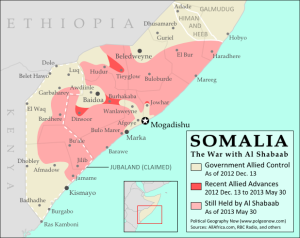Harakat al-Shabaab al-Mujahideen in Somalia: its ideological basis & the means of combating them

The fatwa monitoring observatory at Dar al-Ifta has issued its 16th report titled “Harakat al-Shabaab al-Mujahideen based in Somalia: its ideological basis and practices and the means of combating them”.
The report focuses on the ideological basis of the movement, its structural and organizational composition, its phasic and ultimate targets and the most prominent tools and means it uses to achieve those targets.
The report discusses a number of indictors which reveal the movement’s ideology and activities, the most prominent of which is its tendency to infidelize all prevailing governments and political regimes, accusing them of contradicting Islam and Islamic law and supporting the enemies of Islam.
From its point of view, violence is the only way to cause fundamental changes within the political, social and cultural structures of these regimes. In addition, the movement disacknowledges the concepts of nationality and citizenship because, according to it, they entrench infidel western values and principles. The movement further denies constitutions and secular laws.
Al-Shabaab movement does not recognize borders because it believes that the only bond between people is based on religion which is the basis of inter-relations among the citizens of a country. The movement adopts armed ‘jihad’ to achieve its goals and liberate all Muslim lands from infidel regimes.
According to Al-Shabaab, ruling regimes, their supporters and Sufi trends are enemies. Consequently, it has staged numerous attacks against Sufi shrines and sanctuaries in Somalia.
Concerning al-Shabaab’s links to al-Qaeda, the report said that the geographic nature of Somalia, its strategic location between the countries of the Horn of Africa and the collapse of its central government has paved a fertile environment for al-Qaeda to take root and promote its ideology. The report mentioned that al-Qaeda has succeeded in recruiting a number of Somali youths who formed the basic structure of the Islamic extremist groups that have recently emerged despite a strong presence of the traditional Sufi sect.
The report described Somalia as a safe haven for al-Qaeda, an arena of terrorist military operations and a recruitment ground. Internet websites have posted footage of al-Qaeda leader, Ayman al-Zawahiri in February 2012 announcing that al-Shabaab has officially joined al-Qaeda international network. The video included a vocal recording of Mukhtar Abu al-Zubair, leader of al-Shabaab, pledging allegiance to al-Zawahiri.
The report confirmed that al-Shabaab’s organizational structure is not an integrated entity but a coalition of several groups adopting non-centralization. In spite of this, they share a common agenda, seeking to defeat the troops of the African Union and Somali governments and implementing Shari’a and Islamic law in daily transactions all over the country.
The organizational structure of the movement consists of the general leader; regional governors; the head of the political administration; an official spokesman; a military operations spokesman; administrative offices which include a Da’wah office, press office and health office; the military force with its sub-divisions, the army, intelligence agency and police; in addition to expedient committees such as the emergency committee.
The report highlighted the most notorious operations executed by the movement, the most recent and brutal of which was its attack against Garissa University College in Kenya that left 147 students dead, its attack against the headquarters of the ministry of higher education in Mogadishu in mid-April which left 5 dead and others seriously injured and its horrific attack in 2012 against Westgate mall in the Kenyan capital of Nairobi which resulted in the deaths of at least 67 persons and 120 injured.
The report underscored the importance of depriving the movement access to its basic financial sources which mainly comprise transfers from European countries and trade, especially the coal trade. It also remarked on the importance of blocking ports and routes used by the movement in its trade and the curtailment of al-Shabaab’s attempts to uproot Sufi thought and sects. According to the report, this could be achieved by providing ideological and financial support and the necessary protection to Sufi trends in Somalia, maintaining communication with them and pledging all forms of moral and financial support including books and written material which support and source Sufi ideology, promote the culture of religious chanting, eulogies, and other soft means of spreading and promoting Sufi ideology.
The report further highlighted the importance of establishing communication and ensuring coordination between Sufi groups in neighboring countries. Equally important is benefitting from the existence of a number of Somali communities in Egypt and preparing them ideologically to combat extremism and assist in the disseminiation of the sound ideology.
Finally, the report called for optimally using media tools to block extremist ideologies, spread and disseminate sound ideologies, and participate in raising awareness, debunking deviant ideas and infedilizing practices through radio stations directed to Somalia in both Arabic and Somali.
 Arabic
Arabic French
French Deutsch
Deutsch Urdu
Urdu Pashto
Pashto Swahili
Swahili Hausa
Hausa
